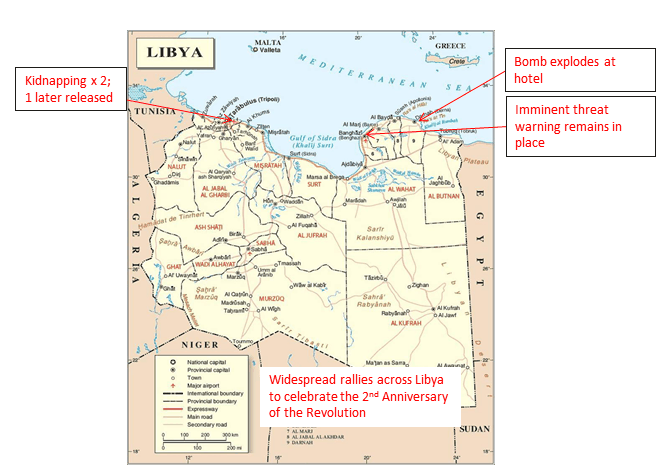By James Hopkinson, Director of Assaye Risk.
(Please click in map to view.)
The major news of the week has been that the second anniversary of the 17th February Revolution passed off peacefully across Libya despite a great deal of concern being expressed by many, both inside and outside the country. There were major rallies held on Friday 15th February in Tripoli, Benghazi, Zawia, Misurata, Surt, Zintan, Derna, Biyda, Tubruq and other cities – all of which appeared to pass off peacefully. The level of incident reporting is also down this week.
This was against a background of many international commercial airlines suspending flights into Libya over the Anniversary period of 15-17th February and a great deal of media speculation of violent protest and elements such as the salafists seeking to hijack or take advantage of the Anniversary for their own ends.
Much of the concern centred on a general sense of disappointment that more has not been achieved in the period by the government. This anger is currently directed at the General National Congress and Mohamed Magariaf, its head rather than the Prime Minister, Ali Ziedan. This is as much because Ali Ziedan has only been in power for just over two months. Progress on issues such as a new constitution has been very slow. The counter revolution movement known as ‘Correction of the Path’ that has grown out of Benghazi and a sense of disenfranchisement did not materialise but remains a potent potential source of discontent and a potential drive towards federalism if greater progress is not made over a range of issues.
Separately, the Paris Conference held on 12th February brought together France, Denmark, Germany, Italy, Malta, Qatar, Spain, Turkey, the UAE, the UK and US with Libya and wider institutions such as the Arab Union, the Arab Maghreb Union, the EU, GCC, Arab League and UN to discuss Libya’s security challenges. The focus was around disarmament and border security of its 6,000km of borders. It was agreed to focus support around Security Sector Reform and as part of that the EU is sending a border security capacity building team in June. It was also agreed to develop a National Security Development Plan and a Justice and Rule of Law Development Plan for Libya.
Separately but connected to this plans were announced on 11th February for biometric passports for all Libyan citizens.
Tripolitania and Tripoli
Although security was higher than usual across the country but particularly in Tripoli with the preparations for the 2nd Anniversary of the Revolution a number of high profile kidnappings still took place. In Tripoli Abdulrahman Abdullah Husseini, the Chairman of the Arab Contracting Union and Colonel Al-Jaaber, Deputy Head of the National Fire Service and Civil Protection Organisation were both separately kidnapped. Husseini was later released on 16th February apparently unharmed. It should, however, be noted that most kidnappings are criminally rather than politically motivated.
There was an arson attack against the Pepsi factory in Tripoli and as yet the motive is not clear.
Gulf of Sidra, Cyrenaica and Benghazi
The warnings of an imminent threat against westerners in Benghazi remain in place with embassies continuing to warn their citizens to stay away from the city. There is no indication at this time when that advice will change for the better.
Separately there was a small explosion, thought to be an Improvised Explosive Device at a hotel in Derna. There were no casualties and the motive for the attack still remains unclear.





